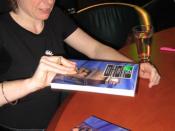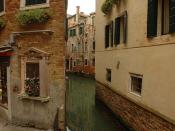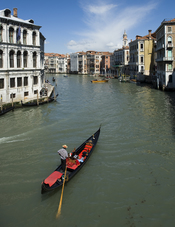Jeanette Winterson talks about passion throughout the novel. Both men and women are vulnerable to their passions. It is this vulnerability that is used to indirectly control and manipulate individuals. Passion in this book is on the surface a force that pushes Napoleon to conquer, makes people follow religion and a force that infatuates lovers. But Winterson suggests that this is the same force that women influence Men.
The venetian canals symbolize the passion that flows through all of us. This parallel is identified through juxtaposition when Villanelle says; " Passion, I spit on it. I spit in the canal"(74). This quote establishes the connection between the Venetian canals and all that is related to them as a metaphor for passion. If the canal symbolizes passion then this city of Venice "city of Satan"(114) is the only city in the world that controls the flow of passion. The author implies that those who control passion like the Venation's are evil like Satan.
Passion as the author describes it is "somewhere between the swamp and the mountains"(74) like Venice, "somewhere between God and the Devil"(74) again like Venice with its many churches and "prostitutes richer than Kings"(114). So what makes Venice evil yet passionate? Winterson disguises Venice as a symbol for a human being. The canals are the arteries of Venice and passion runs through this city like it runs through our own bodies. We seek religion for guidance in the midst of chaos but at night under the mask of darkness does our true self come out and we release our passion. All that is good and bad about human nature is captured in the essence of Venice. Religion is the escape of the city " Everywhere I found a churchâ¦Perhaps here churches spring up overnight"(123) religion guides those who are lost. Like humans the city thrives in darkness "the city of disguises"(61) as Villanelle called it. "What use was the sun to us when our trade and our secrets and our diplomacy depend on darkness?"(61) This quote integrates the use of darkness for both people and the city. The author continues this theme when Villanelle says " In the dark you are in disguise and this is the city of disguises"(61). Having established this connection we need to understand why the author does this, why is Venice a symbol of human beings and why are the canals a symbol of passion in the context of female agency. The answer lies with the boatmen, the boatmen are an interesting aspect to this story and there actions seem almost awkward for something as simple as paddling a boat. But it is these boats these black boats that guide them through the mazes of canals that keep them afloat. They control the passion, they have ancient paths that would leave others lost, their webbed feet are the ultimate symbol of their power over passion. Villanelle who is the only female boat person asks herself "Could I walk on water? Or in other words Can I control passion? She goes on to say: "I faltered at the slippery steps leading into the dark. It was November, after all. I might die if I fall in. I tried balancing my foot on the surface and it dropped beneath into the cold nothingness."(75) This passage when read allegorically in the light of the established connection between the canal and passion is a key moment where the author introduces Villanelles power. We see her exercise her power with her husband the cook using him for money and travel. Henri however is a tragic victim. What napoleon could only nurture is pulled like strings by villanelle, his passion can only be manipulated by Villanelle a women, someone more powerful than Napoleon himself but someone whose power history cannot fathom. Villanelle however is never conscious of her power and never understands her ability. After Henri goes to the asylum Villanelle goes to visit him but as she says " He wouldn't let me comfort him and we never made love again. Not my doing" here the author is trying to emphasize just the opposite, to make the reader realize that it is Villanelles fault but that she is ignorant "like genius she is ignorant of what she does"(174) If we step back for a second and look at the big picture we see that Winterson establishes on the surface to be a skill of Villanelles an advantage that separates her from the other Venetian who are limited to the streets and the bridges symbols of man made structures used to avoid the "cold nothingness" of the canals. But in the same light the author gives us direct examples of her ability to manipulate men. In the Casino she dresses as a boy to deceive the gamblers, but here the author is deceiving us. We as readers expect that Villanelle is at an advantage when she is a boy, she's not harrassed and has what we assume are the advantages associated with being a boy. But in contrast the author shows us that only as a girl can she control, manipulate and dominate power relationships. Take for example her husband, A man she uses for money, travel and





